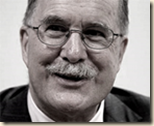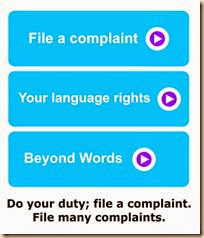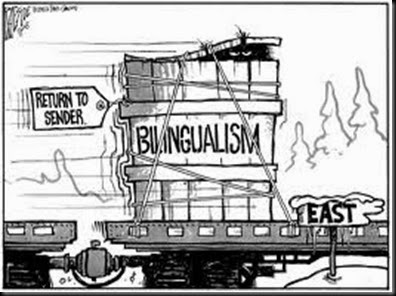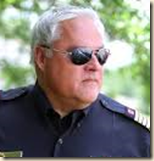By: J. G. Porter
 That the language and culture of French Quebecers need to be defended is evident. Aside from the fact that perhaps a third of the world’s seven billion people speak English, the more compelling case is that some seven million French Quebecers are surrounded by some 330 million Canadians and Americans.
That the language and culture of French Quebecers need to be defended is evident. Aside from the fact that perhaps a third of the world’s seven billion people speak English, the more compelling case is that some seven million French Quebecers are surrounded by some 330 million Canadians and Americans.
This is untenable! Quebecers, through no fault of their own (other than by being defeated on numerous occasions), are outnumbered. There are more of us than them.
 Given these numbers, seven million vs 330 million, Canadians were easily persuaded that the French language and culture were indeed endangered. If Quebécers were ever to be our resourceful and productive national partner, we would first have to protect them. So we promptly rewrote our constitution and enacted legislation to protect, to preserve, and to promote these critically important elements of Frenchness.
Given these numbers, seven million vs 330 million, Canadians were easily persuaded that the French language and culture were indeed endangered. If Quebécers were ever to be our resourceful and productive national partner, we would first have to protect them. So we promptly rewrote our constitution and enacted legislation to protect, to preserve, and to promote these critically important elements of Frenchness.
As an ancillary step in the business of preserving, protecting, and promoting French language and culture, Quebecers pitched right in and declared their province officially unilingual and enacted legislation to restrict the use of English within its national borders. Canadians, freshly minted multiculturalists, cheerily responded, “What a great idea. Every little bit helps.”
 Are these major initiatives paying off? Well let’s, for example, examine Canada’s paper currency; on the front, French and English each have a first place, while on the back, French is first - a significant gain. (Although the two serial numbers on the back appear to be identical, one of the numbers really is French.)
Are these major initiatives paying off? Well let’s, for example, examine Canada’s paper currency; on the front, French and English each have a first place, while on the back, French is first - a significant gain. (Although the two serial numbers on the back appear to be identical, one of the numbers really is French.)
 Highway signs display both languages - except the arrows. Quebec was unable to devise a French arrow and so went with the English version. We were so relieved that they did not get angry with us.
Highway signs display both languages - except the arrows. Quebec was unable to devise a French arrow and so went with the English version. We were so relieved that they did not get angry with us.
Quebecers are well represented in the federal bureaucracy. With 23% of Canada’s population, they fill 29.2% of public service jobs and 32.0% of management-level jobs. A revealing statistic that rightly favours nos amis français menacées.
Quebécers have also done well viz-a-viz our Supreme Court of Canada. Of the nine seats, Quebec, with less than one quarter of the population, is guaranteed one third of the seats. Canadians are rightly proud that Quebecérs, given their record of governance, have been richly rewarded. I’m sure this arrangement dispels some of their sense of victimhood.
Then there is the vexing matter of the Nation’s Capital, the City of Ottawa. Francophone groups are quietly demanding that Mayor Jim Watson declare Ottawa officially bilingual. Mayor Watson says that what we have now is essentially the same thing, mais sans le étiquette.
Mayor Watson just doesn’t get it. By declaring the Nation’s Capital Officially Bilingual, he would effectively tell the nation and, indeed, all places in the world that really matter, that Quebecérs are a force to be reckoned with. These folks have the power and influence to move governments; they know how to get things done. Quebecers are just what we Canadians need to transform our nation’s capital, indeed our nation, into really terrific places.
And speaking of Francophone groups, I am heartened to learn that the list of Francophone organizations operating in Ontario runs to 47 pages, with a Table of Contents thirteen pages long. These organizations, dedicated to the welfare of Ontario’s Francophones and financed from our public purse, work diligently and quietly to expand their power and influence in Ontario. We need to encourage such entities, because they are, apparently, desperately needed to preserve, to protect, and to promote French language and culture.
We should also amend Ontario’s French Language Services Act to include funding for all communities of Francophones under our funding umbrella regardless of their numbers. Premier Wynne can simply shift funds from our education and infrastructure budgets, because, I’m convinced, that if our respective circumstances were reversed, Quebécérs would do the same for us.
On the downside, our efforts are encumbered by many unhelpful businesses; restaurants with English-only menus, and shops using price stickers with the dollar sign up front rather than at the back – as in 4.99$. One can only imagine how exasperated Quebecers must be.
And then we suffered through that embarrassing Air Canada/Sprite debacle. Canadians, realizing that Quebecers would be further victimized, were mortified. Unfortunately, the Supreme Court of Canada ruled in favour of Air Canada and, perhaps, causing Quebecers considerable angst.
 Determined to get it right, Canada hired Graham Fraser, a latter-day Bulldog Drummond, to deal with such miscreants. Mr. Fraser runs the Office of the Commissioner of Official Languages.
Determined to get it right, Canada hired Graham Fraser, a latter-day Bulldog Drummond, to deal with such miscreants. Mr. Fraser runs the Office of the Commissioner of Official Languages.
With an annual budget of 20$ million, the OCOL receives some 800 complaints per year, examines the minutiae of our sins, and dutifully reports them to the Federal Government.
At a cost of ~$25,000$ per complaint, some churlish Canadians point out that Mr. Fraser is little more than a high-end tattletale. They point out that OCOL’s 20M$ annual stipend would send two or three hundred young Canadians through four years of university.
complaint, some churlish Canadians point out that Mr. Fraser is little more than a high-end tattletale. They point out that OCOL’s 20M$ annual stipend would send two or three hundred young Canadians through four years of university.
I say we disregard his generous budget, and consider that Mr. Fraser, by his very presence, if not his handiwork, must surely be a terrific morale booster for Quebecers, and, of course, further evidence that Canada cares.
On learning recently that Quebec does not have an Office of Anglophone Affairs, Mr. Fraser promptly called for one. Premier Couillard said, in effect, “Vous plaisantez!”, and I agree! Mon Diéu, such a move would surely undermine Canada’s diligent efforts to preserve, to protect, and to promote the French language and culture. Just imagine if we had to pitch in to preserve, protect, and promote the English language and culture in Quebec as well!
Since we are discussing costs, other churlish Canadians grump about the costs of official bilingualism. I say, costs must not be considered a drag on the economy especially since this money is spent on such a national resource as vital as Quebec. 2.4$B a year is a pittance.
When Canadians venture into la Belle Province, we see virtually all French and very little English. In fact, one can travel many miles in Québec and see no English. And that’s as it should be. Bits of English scattered hither and yon serve only to exacerbate Quebecers’ sense of victimhood.
So, is Quebec an avid, productive, resourceful, diligent partner in building a healthy, vibrant nation? I say definitely not! Canada must work much harder on this file. As I mentioned earlier, we must increase funding to Francophone organizations in Ontario, and the other provinces, and eliminate the degrading restriction, “Where numbers warrant’.
We must also increase Quebéc’s share of equalization transfers from 50% of the total to, at least, 75%. How are they to otherwise increase, or even maintain, their ever popular subsidies for tuition, daycare, and electricity? At $1.3B$ per month, the cost of keeping Quebec in Confederation is fair value.
Quebec currently receives only 40% of all corporate subsidies. I say that la belle province should get much, much more, especially now that Bombardier is ailing – again.
 And speaking of this iconic Quebec corporation, some churlish Canadians are demanding that Bombardier repay the 1.3$ billion in loans it has received from Industry Canada since 1966. I say, forget it; if Bombardier can’t pay it back, so be it. And besides, being a Quebec company, Bombardier most assuredly needs special considerations.
And speaking of this iconic Quebec corporation, some churlish Canadians are demanding that Bombardier repay the 1.3$ billion in loans it has received from Industry Canada since 1966. I say, forget it; if Bombardier can’t pay it back, so be it. And besides, being a Quebec company, Bombardier most assuredly needs special considerations.
 Another disparity that needs to be fixed involves Newfoundland’s Churchill Falls Power Generating Station. Quebec’s take from this facility is only 1,700M$ per year, while Newfoundland gets a whopping 63M$. Because Quebecers’ needs are far greater than those of Newfoundlanders’, our East Coast brethren should turn its share over to Québec.
Another disparity that needs to be fixed involves Newfoundland’s Churchill Falls Power Generating Station. Quebec’s take from this facility is only 1,700M$ per year, while Newfoundland gets a whopping 63M$. Because Quebecers’ needs are far greater than those of Newfoundlanders’, our East Coast brethren should turn its share over to Québec.
Ontario spends about $1,275 per minority person – including Francophones, while Québec spends about 85$ per minority person – mostly Anglophones. I urge Premier Wynne to visit the bond market and ramp this number up, and Premier Couillard to spend far less on resident Canadians. We are not the needy ones in this nation.
Despite my optimism concerning Quebecers’ aspirations to be an equal partner, the folks with whom I discuss these matters remain bitterly hostile. They insist that equal partners we are not; this relationship is horribly lop-sided. They say Canadians are givers and Quebecers are takers. They liken Canada to a big hose gushing cash into Quebec’s pond - a pond that leaks a lot! I urge patience; leaky ponds can, perhaps, be patched. Which is essentially what Madam Justice Charbonneau may be attempting to do. Considering Quebec’s comfortable relationship with its endemic corruption, we wish Madam bon chance avec ça!
My friends insist that, by their indifference toward Canada’s generosity, Quebecers demonstrate their deep sense of entitlement and of contempt. If Quebecers were interested in an equal partnership, they would, as do other cultures in Canada, earn their way rather than suck up billions in welfare.
My friends tell me that, contrary to popular belief, Quebecers haven’t the slightest interest in sharing power with Canadians. As evidence, they point to the Cornwall General Hospital, a bellwether facility governed, of late, by Francophones, and which is now a place where Canadian workers are no longer welcome. I say that Quebecers are just gaining much needed managerial experience. If they intend to govern Ontario as well as Canadians occasionally do, they need to start small and learn along the way.
 My friends point out, at times darkly, that our new constitution and language legislation are monstrous. These things are coercive, intrusive, cumbersome, burdensome, horribly expensive, and seriously biased to favour Quebecers. They insist these two national initiatives, terrific achievements they may be, do not unite our two solitudes; they divide.
My friends point out, at times darkly, that our new constitution and language legislation are monstrous. These things are coercive, intrusive, cumbersome, burdensome, horribly expensive, and seriously biased to favour Quebecers. They insist these two national initiatives, terrific achievements they may be, do not unite our two solitudes; they divide.
In my darker moments, I agree.
 That the language and culture of French Quebecers need to be defended is evident. Aside from the fact that perhaps a third of the world’s seven billion people speak English, the more compelling case is that some seven million French Quebecers are surrounded by some 330 million Canadians and Americans.
That the language and culture of French Quebecers need to be defended is evident. Aside from the fact that perhaps a third of the world’s seven billion people speak English, the more compelling case is that some seven million French Quebecers are surrounded by some 330 million Canadians and Americans.  Given these numbers, seven million vs 330 million, Canadians were easily persuaded that the French language and culture were indeed endangered. If Quebécers were ever to be our resourceful and productive national partner, we would first have to protect them. So we promptly rewrote our constitution and enacted legislation to protect, to preserve, and to promote these critically important elements of Frenchness.
Given these numbers, seven million vs 330 million, Canadians were easily persuaded that the French language and culture were indeed endangered. If Quebécers were ever to be our resourceful and productive national partner, we would first have to protect them. So we promptly rewrote our constitution and enacted legislation to protect, to preserve, and to promote these critically important elements of Frenchness.  Are these major initiatives paying off? Well let’s, for example, examine Canada’s paper currency; on the front, French and English each have a first place, while on the back, French is first - a significant gain. (Although the two serial numbers on the back appear to be identical, one of the numbers really is French.)
Are these major initiatives paying off? Well let’s, for example, examine Canada’s paper currency; on the front, French and English each have a first place, while on the back, French is first - a significant gain. (Although the two serial numbers on the back appear to be identical, one of the numbers really is French.)  Highway signs display both languages - except the arrows. Quebec was unable to devise a French arrow and so went with the English version. We were so relieved that they did not get angry with us.
Highway signs display both languages - except the arrows. Quebec was unable to devise a French arrow and so went with the English version. We were so relieved that they did not get angry with us. Determined to get it right, Canada hired Graham Fraser, a latter-day Bulldog Drummond, to deal with such miscreants. Mr. Fraser runs the Office of the Commissioner of Official Languages.
Determined to get it right, Canada hired Graham Fraser, a latter-day Bulldog Drummond, to deal with such miscreants. Mr. Fraser runs the Office of the Commissioner of Official Languages. complaint, some churlish Canadians point out that Mr. Fraser is little more than a high-end tattletale. They point out that OCOL’s 20M$ annual stipend would send two or three hundred young Canadians through four years of university.
complaint, some churlish Canadians point out that Mr. Fraser is little more than a high-end tattletale. They point out that OCOL’s 20M$ annual stipend would send two or three hundred young Canadians through four years of university.  And speaking of this iconic Quebec corporation, some churlish Canadians are demanding that Bombardier repay the 1.3$ billion in loans it has received from Industry Canada since 1966. I say, forget it; if Bombardier can’t pay it back, so be it. And besides, being a Quebec company, Bombardier most assuredly needs special considerations.
And speaking of this iconic Quebec corporation, some churlish Canadians are demanding that Bombardier repay the 1.3$ billion in loans it has received from Industry Canada since 1966. I say, forget it; if Bombardier can’t pay it back, so be it. And besides, being a Quebec company, Bombardier most assuredly needs special considerations. Another disparity that needs to be fixed involves Newfoundland’s Churchill Falls Power Generating Station. Quebec’s take from this facility is only 1,700M$ per year, while Newfoundland gets a whopping 63M$. Because Quebecers’ needs are far greater than those of Newfoundlanders’, our East Coast brethren should turn its share over to Québec.
Another disparity that needs to be fixed involves Newfoundland’s Churchill Falls Power Generating Station. Quebec’s take from this facility is only 1,700M$ per year, while Newfoundland gets a whopping 63M$. Because Quebecers’ needs are far greater than those of Newfoundlanders’, our East Coast brethren should turn its share over to Québec.  My friends point out, at times darkly, that our new constitution and language legislation are monstrous. These things are coercive, intrusive, cumbersome, burdensome, horribly expensive, and seriously biased to favour Quebecers. They insist these two national initiatives, terrific achievements they may be, do not unite our two solitudes; they divide.
My friends point out, at times darkly, that our new constitution and language legislation are monstrous. These things are coercive, intrusive, cumbersome, burdensome, horribly expensive, and seriously biased to favour Quebecers. They insist these two national initiatives, terrific achievements they may be, do not unite our two solitudes; they divide.






